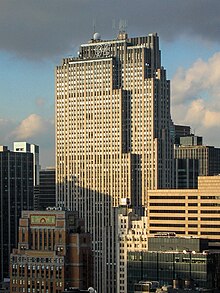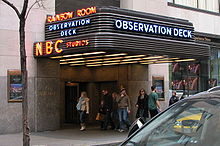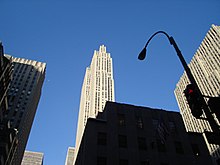History of NBC
NBC was founded in 1926 by the Radio Corporation of America (RCA), a then-subsidiary of General Electric (GE), making it the oldest major broadcast network in the United States.
New parent RCA saw an advantage in sharing programming, and after getting a license for radio station WRC in Washington, D.C., in 1923, attempted to transmit audio between cities via low-quality telegraph lines.
[9][10] A variant sequence with an additional note, G-E'-C'-G, known as "the fourth chime", was used during significant events of extreme urgency (including during World War II, especially in the wake of the December 1941 attack on Pearl Harbor; on D-Day and during disasters).
Other programs featured on the network included Vic and Sade, Fibber McGee and Molly, The Great Gildersleeve, One Man's Family, Ma Perkins and Death Valley Days.
During 1948 and 1949, beginning with the nation's top radio star, Jack Benny, many NBC performers – including Edgar Bergen and Charlie McCarthy, Burns and Allen and Frank Sinatra – jumped to CBS.
Monitor was a continuous all-weekend mixture of music, news, interviews, and features, with a variety of hosts including well-known television personalities Dave Garroway, Hugh Downs, Ed McMahon, Joe Garagiola, and Gene Rayburn.
The potpourri show tried to keep vintage radio alive by featuring segments from Jim and Marian Jordan (in character as Fibber McGee and Molly); Peg Lynch's dialog comedy Ethel and Albert (with Alan Bunce); and iconoclastic satirist Henry Morgan.
[17] After Monitor ended its 20-year run on January 26, 1975, little remained of NBC network radio beyond hourly newscasts and news features, and Sunday morning religious program The Eternal Light.
Reportedly, the first NBC Television "network" program was broadcast on January 12, 1940, when a play titled Meet The Wife was originated at the W2XBS studios at Rockefeller Center and rebroadcast by W2XB/W2XAF (now WRGB) in Schenectady, which received the New York station directly off-air from a tower atop a mountain and relayed the live signal to the Capital District.
The most ambitious NBC television "network" program of the pre-war era was the telecast of the Republican National Convention held in Philadelphia in the summer of 1940, which was fed live to the New York City and Schenectady stations.
[51] However, despite major promotion by RCA, television sales in New York from 1939 to 1942 were disappointing, primarily due to the high cost of the sets, and the lack of compelling regularly scheduled programming.
One special event was Franklin D. Roosevelt's second and final appearance on live television, when his speech at Madison Square Garden on October 28, 1940, was telecast over W2XBS to receivers in the New York City area.
The first official, paid television advertisement broadcast by any U.S. station was for watch manufacturer Bulova, which aired that day, just before the start of a Brooklyn Dodgers baseball telecast on WNBT.
Even before the war concluded, a few programs were sent from New York City to affiliated stations in Philadelphia (WPTZ) and Albany/Schenectady (WRGB) on a regular weekly schedule beginning in 1944, the first of which is generally considered to be the pioneering special interest/documentary show The Voice of Firestone Televues, a television offshoot of The Voice of Firestone, a mainstay on NBC radio since 1928, which was transmitted from New York City to Philadelphia and Schenectady on a regular, weekly basis beginning on April 10, 1944.
The film's showings on NBC were distinctive as it televised The Wizard of Oz without a hosted introduction, as CBS had long done; it was also slightly edited for time in order to make room to air more commercials.
Failures accumulated rapidly under his watch (such as Hello, Larry, Supertrain, Pink Lady and Jeff, The Krofft Superstar Hour, season six of Saturday Night Live, and The Waverly Wonders).
During this time, several longtime affiliates also defected from NBC in markets such as Atlanta (WSB-TV), Bakersfield (KERO-TV), Baltimore (WBAL-TV), Baton Rouge (WBRZ-TV), Billings (KTVQ), Brownsville (KRGV-TV), Charlotte (WSOC-TV), Columbia, Missouri (KOMU-TV), Dayton (WDTN), Decatur (WAAY-TV), El Dorado (KLAA), Eugene (KVAL-TV), Fargo (WDAY-TV), Fort Smith (KFSM-TV), Green Bay (WFRV-TV), Indianapolis (WRTV), Jacksonville (WTLV), Knoxville (WATE-TV), Marquette (WJMN-TV), Minneapolis-St. Paul (KSTP-TV), Medford (KTVL), Odessa (KMID), Panama City (WMBB), Rapid City (KOTA-TV), San Diego (KGTV), Savannah (WSAV-TV), Schenectady (WRGB), Sioux Falls (KSFY-TV), Temple (KCEN-TV), Tyler (KLTV), Waterbury (WATR-TV) and Wheeling (WTRF-TV).
[72] After President Jimmy Carter pulled the U.S. team out of the 1980 Summer Olympics, NBC canceled a planned 150 hours of coverage (which had cost $87 million for the broadcast rights), placing the network's future in doubt.
The network's upswing continued late into the decade with ALF, Amen, Matlock, L.A. Law, The Hogan Family, A Different World, Empty Nest, Unsolved Mysteries, and In the Heat of the Night.
The 1988–89 season saw NBC have an astounding 17 series in Nielsen's year-end Top 30 most-watched network programs; it also ranked at first place in the weekly ratings for more than 12 months, an unprecedented achievement that has not been duplicated since.
One of Tartikoff's late acquisitions, Seinfeld initially struggled from its debut in 1989 as a summer series, but grew to become one of NBC's top-rated shows after it was moved to Thursdays in the time slot following Cheers.
Cheers spinoff Frasier became a critical and commercial success, usually landing in the Nielsen Top 20 – although its ratings were overshadowed to a minor extent by Friends – and went on to win numerous Emmy Awards (eventually setting a record for a sitcom that lasted until it was overtaken by Modern Family in 2014).
Littlefield was replaced as president of NBC Entertainment by Scott Sassa, who oversaw the development of such shows as The West Wing, Law & Order: Special Victims Unit and Fear Factor.
The 2006–07 season was a mixed bag for the network, with Deal or No Deal remaining strong and Heroes becoming a surprise hit on Monday nights, while the highly touted Studio 60 on the Sunset Strip (from West Wing creator Aaron Sorkin) lost a third of its premiere-night viewers by Week 6 and was eventually canceled; two critically acclaimed sitcoms, The Office and 30 Rock, also pulled in modest successes and went on to win the Emmy Award for Outstanding Comedy Series for four consecutive years.
"[108] Conversely, industry executives criticized the network for abandoning a history of airing quality dramas in the 10:00 hour, and expressed concern that it would hurt NBC by undermining a reputation built on successful scripted series.
[113] In the spring of 2010, cable provider and multimedia firm Comcast announced it would acquire a majority interest in NBC Universal from General Electric, which would retain a minority stake in the company in the interim.
NBC nearly completed its full conversion to an all-HD schedule (outside of the Saturday morning time slot leased by the Qubo consortium, which NBCUniversal would rescind its stake in the following year) on September 20, 2011, when Last Call with Carson Daly converted to the format with the premiere of its 11th season.
NBC bounced back to first place network in adults 18–49 that fall, boosted by the new season of The Voice, the initial success of freshman drama Revolution and sitcom Go On, and the continued strength of Sunday Night Football.
However, after withholding the new season of The Voice and benching Revolution until late March, NBC's midseason ratings suffered, falling to fifth place behind Spanish-language network Univision during the February sweeps period.
Nevertheless, the network continued to experience success with most of its returning series, especially The Blacklist (despite a modest decline in viewership following its move to Thursdays midway through the season, due partly to an initial weak lead-in from miniseries The Slap).









